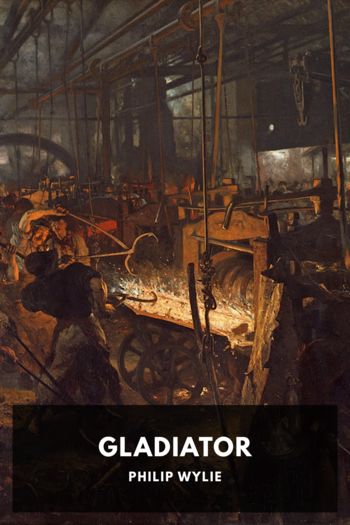Gladiator, Philip Wylie [win 10 ebook reader .TXT] 📗

- Author: Philip Wylie
Book online «Gladiator, Philip Wylie [win 10 ebook reader .TXT] 📗». Author Philip Wylie
He was barren of desire to investigate deeper into the philosophy of himself. All people turned aside by fate fall into the same morass. Except in his strength, Hugo was pitifully like all people: wounds could easily be opened in his sensitiveness; his moral courage could be taxed to the fringe of dilemma; he looked upon his fellow men sometimes with awe at the variety of high places they attained in spite of the heavy handicap of being human—he looked upon them again with repugnance—and very rarely, as he grew older, did such inspections of his kind include a study of the difference between them and him made by his singular gift. When that thought entered his mind, it gave rise to peculiar speculations.
He approached thirty, he thought, and still the world had not reechoed with his name; the trumps, banners, and cavalcade of his glory had been only shadows in the sky, dust at sunset that made evanescent and intangible colors. Again, he thought, the very perfection of his prowess was responsible for its inapplicability; if he but had an Achilles’ heel so that his might could taste the occasional tonic of inadequacy, then he could meet the challenge of possible failure with successful effort. More frequently he condemned his mind and spirit for not being great enough to conceive a mission for his thews. Then he would fall into a reverie, trying to invent a creation that would be as magnificent as the destructions he could so easily envision.
In such a painful and painstaking mood he was carried over the Alleghenies and out on the Western plains. He changed trains at Chicago without having slept, and all he could remember of the journey was a protracted sorrow, a stabbing consciousness of Roseanne, dulled by his last picture of her, and a hopeless guessing of what she thought about him now.
Hugo’s mother met him at the station. She was unaltered, everything was unaltered. The last few instants in the vestibule of the train had been a series of quick remembrances; the whole countryside was like a long-deserted house to which he had returned. The mountains took on a familiar aspect, then the houses, then the dingy red station. Lastly his mother, upright and uncompromisingly grim, dressed in her perpetual mourning of black silk. Her recognition of Hugo produced only the slightest flurry and immediately she became mundane.
“Whatever made you come in those clothes?”
“I was working outdoors, mother. I got right on a train. How is father?”
“Sinking slowly.”
“I’m glad I’m in time.”
“It’s God’s will.” She gazed at him. “You’ve changed a little, son.”
“I’m older.” He felt diffident. A vast gulf had risen between this vigorous, religious woman and himself.
She opened a new topic. “Whatever in the world made you send us all that money?”
Hugo smiled. “Why—I didn’t need it, mother. And I thought it would make you and father happy.”
“Perhaps. Perhaps. It has done some good. I’ve sent four missionaries out in the field and I am thinking of sending two more. I had a new addition put on the church, for the drunkards and the fallen. And we put a bathroom in the house. Your father wanted two, but I wouldn’t hear of it.”
“Have you got a car?”
“Car? I couldn’t use one of those inventions of Satan. Your father made me hire this one to meet you. There’s Anna Blake’s house. She married that fellow she was flirting with when you went away. And there’s our house. It was painted last month.”
Now all the years had dropped away and Hugo was a child again, an adolescent again. The car stopped.
“You can go right up. He’s in the front room. I’ll get lunch.”
Hugo’s father was lying on the bed watching the door. A little wizened old man with a big head and thin yellow hands. Illness had made his eyes rheumy, but they lighted up when his son entered, and he half raised himself.
“Hello, father.”
“Hugo! You’ve come back.”
“Yes, father.”
“I’ve waited for you. Sit down here on the bed. Move me over a little. Now close the door. Is it cold out? I was afraid you might not get here. I was afraid you might get sick on the train. Old people are like that, Hugo.” He shaded his eyes. “You aren’t a very big man, son. Somehow I always remembered you as big. But—I suppose”—his voice thinned—“I suppose you don’t want to talk about yourself.”
“Anything you want to hear, father.”
“I can’t believe you came back.” He ruminated. “There were a thousand things I wanted to ask you, son—but they’ve all gone from my mind. I’m not so easy in your presence as I was when you were a little shaver.”
Hugo knew what those questions would be. Here, on his deathbed, his father was still a scientist. His soul flinched from giving its account. He saw suddenly that he could never tell his father the truth; pity, kindredship, kindness, moved him. “I know what you wanted to ask, father. Am I still strong?” It took courage to suggest that. But he was rewarded. The old man sighed ecstatically. “That’s it, Hugo, my son.”
“Then—father, I am. I grew constantly stronger when I left you. In college I





Comments (0)